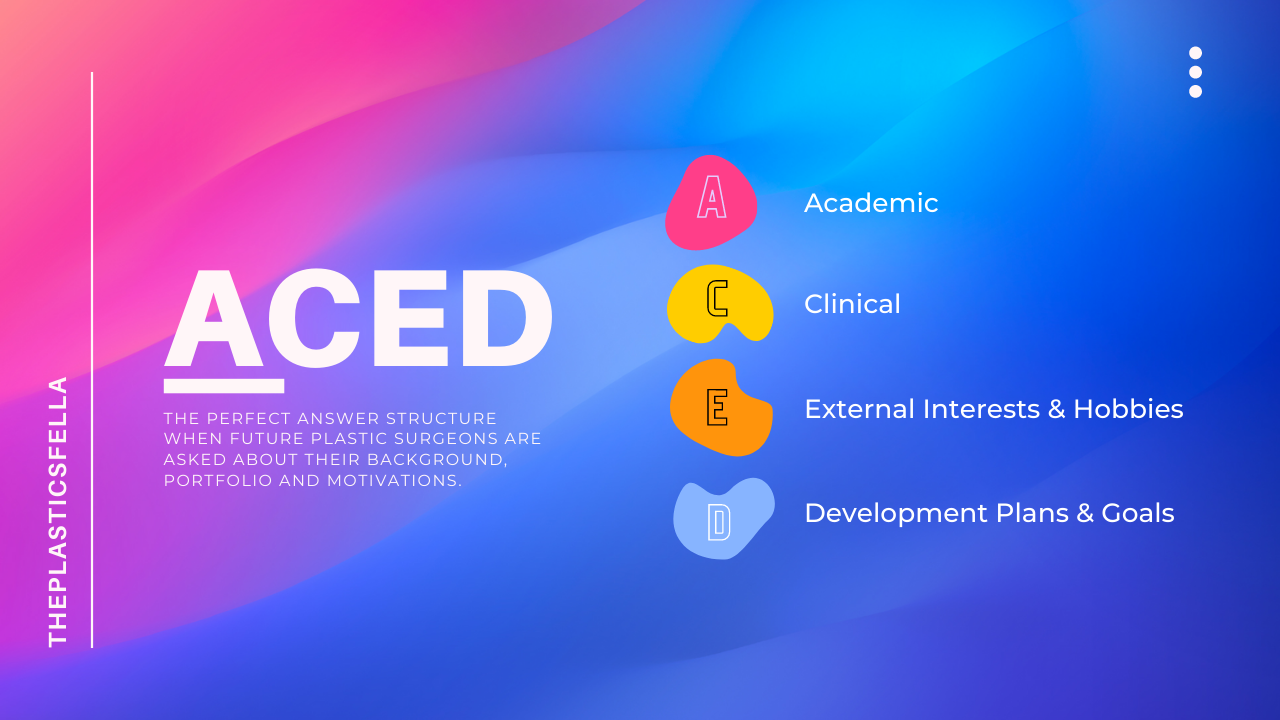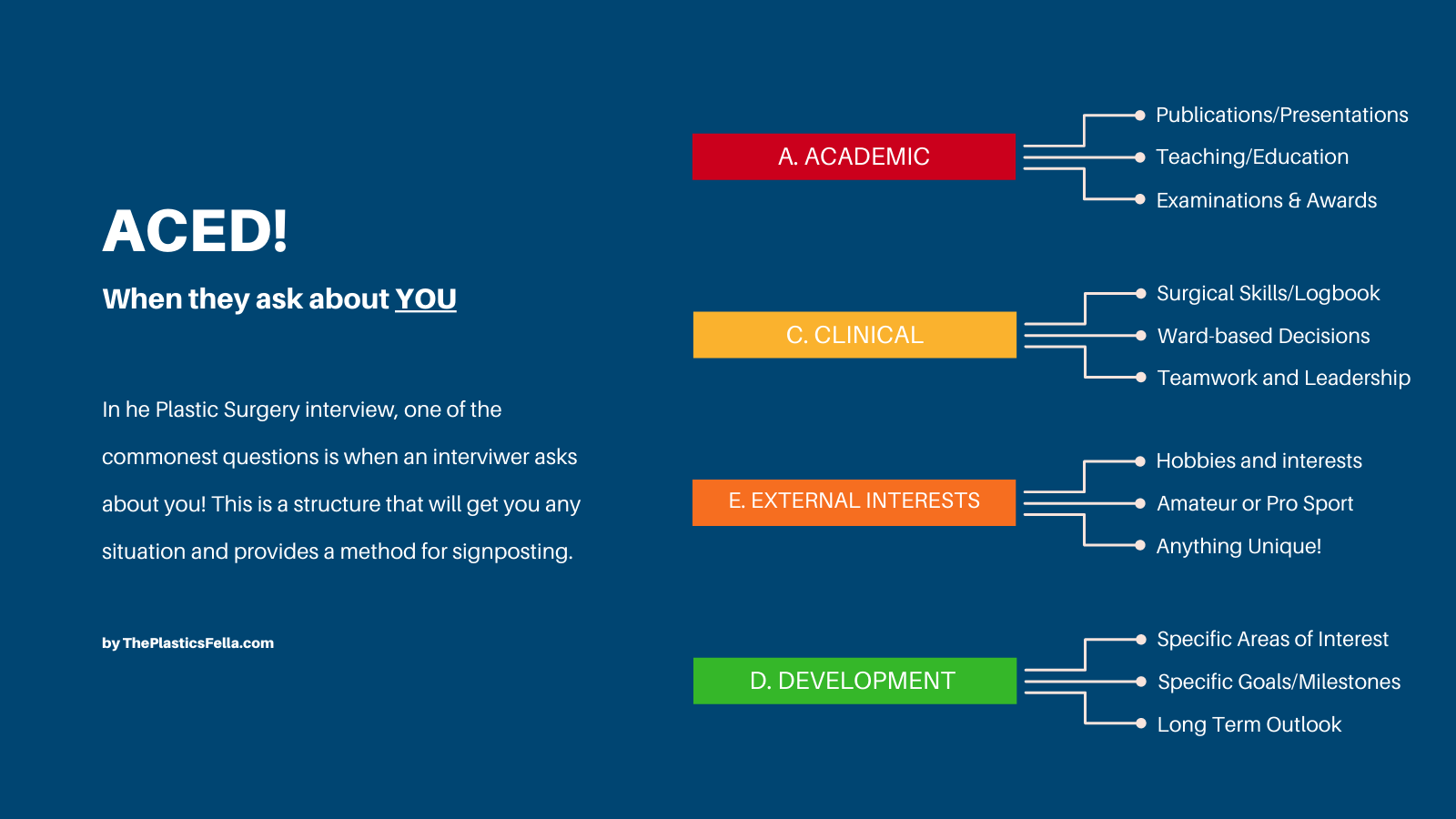In plastic surgery interviews, personal questions play a pivotal role in assessing a candidate's suitability for the specialty. These questions delve into various aspects of your profile, from your CV highlights to your motivation and long-term plans.
The ACED mnemonic is a strategic tool designed to help you effectively showcase your qualifications, commitment, and vision in plastic surgery, ensuring you present a well-rounded and compelling narrative. It is designed to align with the core competencies of technical expertise, ethical practice, continuous learning, and patient-centered care.
Achievements: Highlight your successes
Commitment: Show your dedication to plastic surgery
Enthusiasm: Express your passion for the field
Development: Discuss your growth and future goals.
Whether you're a seasoned practitioner or an aspiring surgeon, the ACED template empowers you to present a comprehensive and authentic picture of yourself, ensuring that every aspect of 'you' aligns with the high standards and dynamic nature of the plastic surgery field.

In the fast-paced environment of plastic surgery interviews, our answer structure is intentionally straightforward. Each heading - Achievements, Commitment, Enthusiasm, Development - acts as a guide, ensuring clarity and focus in your responses.
While P'Fella offers foundational advice, you're encouraged to weave in your personal experiences, making each answer uniquely yours.

The effectiveness of the good examples lies in their specificity, relevance, and alignment with the key qualities sought in plastic surgery candidates: expertise, dedication, passion, and a clear developmental trajectory. Conversely, the bad examples suffer from vagueness, lack of focus, and a failure to convincingly showcase these qualities
Achievements
Key Point
Highlight your notable accomplishments in your medical career or education.
Your achievements are testament to your skill and potential in the field of plastic surgery. Highlighting them is not just about showcasing past successes; it's about demonstrating how these successes make you a prime candidate for further challenges in plastic surgery.
A common pitfall is being too general. Better candidates have specific achievements tied to measurable outcomes or recognitions are more impactful.
- Good Example: "In my master's thesis, I explored innovative skin graft techniques, which was later published in a renowned medical journal. This achievement showcases my commitment to advancing plastic surgery practices."
- Bad Example: "I've completed several assignments during my studies."
Stating "I've completed several assignments during my studies" is too vague and general. It doesn't provide any detail on the relevance or impact of these assignments, making it a weak demonstration of achievement.
Commitment
Key Point
Show your long-standing and active engagement in plastic surgery.
Illustrating your commitment reflects your dedication and long-term interest in plastic surgery, an essential trait for professionals in this evolving field. It’s important because plastic surgery is a demanding field requiring a long-term, sustained commitment.
- Good Example: "For the past two years, I have been involved in a community project providing free reconstructive surgery, demonstrating my commitment to the humanitarian aspect of plastic surgery."
- Bad Example: "I occasionally volunteer at health camps."
The example of being involved in a community project for free reconstructive surgery over two years demonstrates sustained and significant engagement. It not only shows dedication but also aligns with the humanitarian values of plastic surgery, making it a strong indication of commitment.
Enthusiasm
Key Point
Share your genuine passion and why plastic surgery captivates yo
Convey your genuine passion for plastic surgery and what drives it. Genuine enthusiasm for plastic surgery is infectious and indicative of your motivation. This is crucial in a field that's as demanding as it is rewarding.
Discuss what specifically in plastic surgery excites you, and how your experiences have fueled this passion.
- Good Example: "My passion for plastic surgery was ignited during my first clinical rotation in reconstructive surgery, where I saw the profound impact on patient’s lives. This experience solidified my commitment to pursuing this challenging yet rewarding field."
- Bad Example: "I think plastic surgery is interesting and offers good career prospects."
Saying "I think plastic surgery is interesting and offers good career prospects" is a superficial statement. It lacks personal connection and fails to convey a genuine, intrinsic interest in the field, coming across as more career-oriented than passion-driven.
Development
Key Point
Paint a picture of your growth trajectory and future aspirations in plastic surgery.
Illustrate your professional growth and future goals in plastic surgery. Discussing your growth and future goals shows you’re thinking ahead and are eager to contribute to the evolution of plastic surgery.
A common pitfall is vague or overly broad future plans can seem unfocused. Be specific about your aspirations.
- Good Example: "Starting as a medical intern, I have progressively taken on more complex cases in plastic surgery. My goal is to specialize in pediatric reconstructive surgery, contributing to both clinical practice and research in this area."
- Bad Example: "I've been working in surgery for a while now and plan to keep improving."
In the good example: the journey from a medical intern to handling complex cases, with a future goal of specializing in pediatric reconstructive surgery, illustrates a clear growth trajectory. This progression shows ambition, a willingness to learn, and a specific direction for future development in the field.


